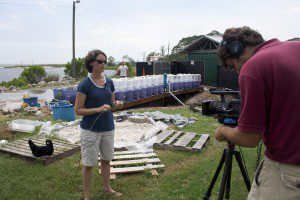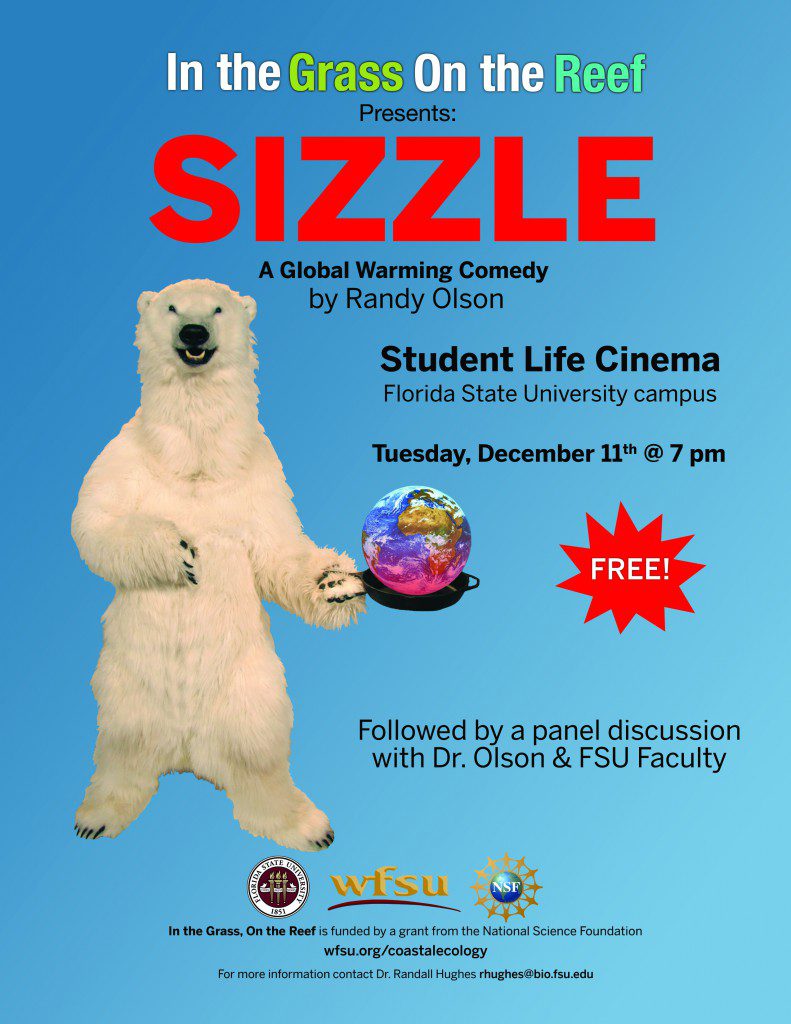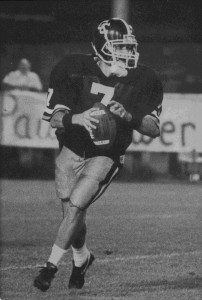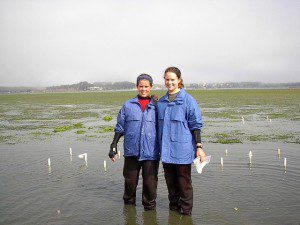Like Randall Hughes and David Kimbro, Dr. Randy Olson is a scientist who wants to make science understandable to a general audience. Dr. Olson’s passion for communicating science led him to USC School of Cinema and a second career in film making. He will be here next week to help bring the inner storyteller our of twelve graduate students, and he’s brought his latest film with him. We hope you can join us.
Dr. Randall Hughes FSU Coastal & Marine Lab
There’s nothing like lots of time with family over Thanksgiving to drive home the fact that some people are inherently better storytellers than others. How else could you stand to listen to the same story about the come-from-behind, last-minute win (that I witnessed first-hand) year in and year out? Or have someone recount something as mundane as a TV commercial and have you falling out of your seat laughing? Or watch an impersonation of a dog’s attempts to garner some attention that is funnier than the original video? My family is blessed with a number of good storytellers, and I’ll confess that I’m not one of them. So is there any hope for me?
If you’d asked me that question a few years ago, I would have answered with a resounding “No”. I’ve always considered storytelling as one of those innate gifts that some people have and others don’t, with me in the latter category. For one, I prefer to write things down, organizing and re-organizing my thoughts on the page until I get them just right. That way, if I forget the ‘punch line’, I can come back to it later, a strategy that definitely doesn’t work well when telling a joke aloud! Also, I’m much more comfortable coalescing others’ ideas into an organized fashion for a fact-based paper than creating a novel story from scratch (think English 101 vs. Creative Writing). But other than not being the most entertaining relative at family gatherings, does my inability to tell a good story really matter?
This time, I’d have to answer “Yes”. Over the last several years, I’ve become more and more concerned about the disconnect between the scientific world and the “everyday” world. (The fact that it’s acceptable to suggest that science is somehow divorced from everyday life without raising lots of eyebrows is an indication of what I’m talking about.) And I think part of the responsibility for fixing this divide lies with scientists, in that we need to do a better job of explaining to our friends and family (for starters) why our work matters to them. But only the closest and most devoted of relatives (thank you, Mama Jennie!) will read my scientific publications, and only the most in need of a job (here’s looking at you, Jules!) will commit to working as my research assistant for a summer to learn the ins and outs of what I do. So we’re back to the need for me to tell a story, and a good story at that, to grab people’s interest and inspire them to want to know more.

Randall being interviewed by WFSU producer Rob Diaz de Villegas at the FSU Coastal & Marine Lab in July 2010.
Enter my collaboration with WFSU. Just prior to the Deepwater Horizon oil spill, I had a meeting with Kim Kelling-Engstrom about the possibilities of a joint effort to communicate David’s and my research to a general audience with help from the professionals at WFSU. When the spill occurred, the impetus to document our research on the amazing coastal ecosystems of northern Florida became even more urgent, and we launched this blog. For someone who rarely agrees to having my picture taken, it was a big leap to regularly go in front of a camera and talk about what I do, and why I think it’s important. And it’s been a steep learning curve! But I’m beginning to realize (hope?) that telling a story is a lot like playing sports – some people start with a leg up in the talent department, but everyone gets better with practice.
So how do you learn to tell a convincing story? What are the tricks of the trade? To find out more, David and I have invited Dr. Randy Olson, the self-described scientist-turned-filmmaker, to come give a workshop at FSU this month on just this topic. The workshop is for science graduate students interested in learning how to better communicate their ideas and research to a general audience. Randy went to graduate school at Harvard and had a tenured faculty position in marine biology at the University of New Hampshire until he decided to leave his job and enroll in the University of Southern California School of Cinema. Since finishing film school, he’s directed several entertaining and thought-provoking films, as well as written a book about communicating science. So he’s rather uniquely qualified to speak about the particular pitfalls that plague scientists when it comes to telling a good story, as well as how to overcome them.
I’ll be listening in carefully during the workshop, and I’m sure I’ll have some useful tips to share with you (and implement) on this blog in the weeks following. We’re also excited that Randy has offered to do a screening of his movie Sizzle: A Global Warming Comedy at the FSU Student Life Cinema at 7pm on Tuesday, December 11. The movie will be followed by a panel discussion featuring Dr. Olson and several FSU faculty members. The event is free and open to all who are interested, so come join us!
We want to hear from you! Add your question or comment.
In the Grass, On the Reef is funded by the National Science Foundation.



